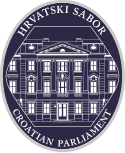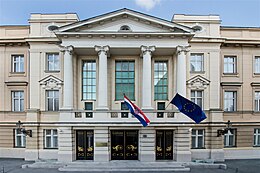
Back برلمان كرواتيا Arabic Parllamentu de Croacia AST Xorvatiya parlamenti Azerbaijani Харвацкі Сабар Byelorussian Харвацкі сабар BE-X-OLD Хърватски събор Bulgarian Hrvatski sabor BS Sabor croat Catalan Sabor Czech Kroatiens parlament Danish
Croatian Parliament Hrvatski sabor | |
|---|---|
| 11th Sabor | |
 Seal of the Croatian Parliament | |
| Type | |
| Type | |
| History | |
| Founded | 1273 (first documented session) 1990 (contemporary) |
| Leadership | |
Deputy Speakers | since 16 May 2024 |
| Structure | |
| Seats | 151 |
 | |
Political groups | Government (66)
Supported by (12) Opposition (72) |
| Elections | |
| Open party-list proportional representation | |
Last election | 17 April 2024 |
Next election | On or before 2028 |
| Meeting place | |
 | |
| Parliament Palace, Zagreb | |
| Website | |
| sabor.hr | |
The Croatian Parliament (Croatian: Hrvatski sabor) or the Sabor[A] is the unicameral legislature of Croatia. Under the terms of the Croatian Constitution, the Sabor represents the people and is vested with legislative power. The Sabor is composed of 151 members elected to a four-year term on the basis of direct, universal and equal suffrage by secret ballot. Seats are allocated according to the Croatian Parliament electoral districts: 140 members of the parliament are elected in multi-seat constituencies. An additional three seats are reserved for the diaspora and Croats in Bosnia and Herzegovina, while national minorities have eight places reserved in parliament.[2] The Sabor is presided over by a Speaker, who is assisted by at least one deputy speaker (usually four or five deputies).
The Sabor's powers are defined by the Constitution and they include: defining economic, legal and political relations in Croatia, preservation and use of its heritage and entering into alliances. The Sabor has the right to deploy the Croatian Armed Forces abroad, and it may restrict some constitutional rights and liberties in wartime or in cases of imminent war or following natural disasters. The Sabor amends the borders of Croatia or the Constitution, enacts legislation, passes the state budget, declares war and decides on cessation of hostilities, adopts parliamentary resolutions and bylaws, adopts long-term national security and defence strategies, implements civil supervision of the armed forces and security services, calls referendums, performs elections and appointments conforming to the constitution and applicable legislation, supervises operations of the Government and other civil services responsible to the parliament, grants amnesty for criminal offences and performs other duties defined by the constitution.
The oldest Sabor with extant records was held in Zagreb on 19 April 1273. This was the Sabor of Slavonia, and not of Croatia and Dalmatia. The earliest recorded Sabor of the Kingdom of Croatia and Dalmatia dates to 1350 in Podgrađe near Benkovac.[3] The Parliament session held in 1527 in Cetin affirmed the House of Habsburg as Croatian rulers. After this, the Sabor became a regular gathering of the nobility, and its official title gradually stabilised by 1558 as the Parliament of the Kingdom of Croatia and Slavonia. Since 1681, it has been formally called the Diet of the Kingdom of Croatia, Dalmatia and Slavonia. In 1712, the Sabor once again invoked its prerogative to select the ruler, supporting what later became the Pragmatic Sanction of 1713. Since the mid-1800s, the Sabor has regularly met and its members have been regularly elected. Exercising its sovereignty once again on 29 October 1918, the Sabor decided on independence from Austria-Hungary and formation of the State of Slovenes, Croats and Serbs which later joined the Kingdom of Serbs, Croats and Slovenes. The Sabor did not meet between 1918 and 1945, except for an unelected Sabor convened in 1942. The Sabor initially reconvened as an assembly of State Anti-fascist Council for the National Liberation of Croatia (ZAVNOH) in 1943 and evolved since through various structures following the November 1945 elections and several changes of the constitution. After the first multi-party elections since Communist rule and the adoption of the 1990 constitution, the Sabor was bicameral (Chamber of Representatives and Chamber of Counties) until 2001, when constitutional amendments changed it to the unicameral form currently used.
Cite error: There are <ref group=lower-alpha> tags or {{efn}} templates on this page, but the references will not show without a {{reflist|group=lower-alpha}} template or {{notelist}} template (see the help page).
- ^ "Hrvatski sabor obilježava Međunarodni dan demokracije" [Croatian Parliament marks the international day of democracy] (in Croatian). Sabor. 15 September 2009. Archived from the original on 7 August 2018. Retrieved 10 February 2012.
- ^ "Knife-Edge Result Likely in Croatian Elections". Balkan Insight. 6 November 2015. Retrieved 7 August 2020.
- ^ "Zasjedanje prvog Općeg sabora Kraljevine Dalmacije i Hrvatske 1350. godine". Hrvatski sabor (in Croatian). Retrieved 21 May 2024.
Cite error: There are <ref group=upper-alpha> tags or {{efn-ua}} templates on this page, but the references will not show without a {{reflist|group=upper-alpha}} template or {{notelist-ua}} template (see the help page).